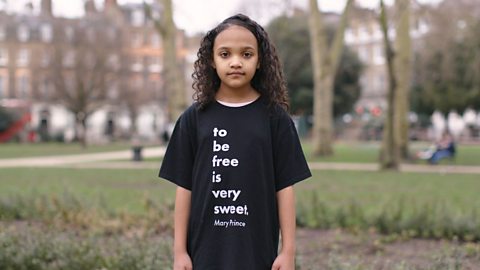NAOMI:Hi, my name is Naomi, and I'm 10 years old. My family is from Jamaica, a former British colony in the heart of the Caribbean. Jamaicans have lived in the UK since the 1700s, but the largest number moved here after World War Two, when Britain needed helpfrom lots of people to rebuild the economy. Jamaicans are known for having a rich culture. Our culture is made up of lots of good food, music, art, literature and dance. I love to snap photos that capture the culture around my community and, when I grow up, Iwant to be a professional photographer. In order to learn more about what it's like to become a photographer who captures historyand culture, I'm reaching out to one of my favourite photographers - Dennis Morris.
DENNIS:I was born in Jamaica and I came to England in the 60s. Now, I grew up in the East End of London, where there was a very largeWest Indian community. It was an introduction to a way of life which I'd never seen before, because in Jamaica, at that point, no one had a television and very few people had a radio. So it was all a bit of an eye opener for me really, it was a real surprise. The local vicar asked me if I would like to join the choir, and I said yes. And one of the things they had in the choir was a photographic club. And I remember wandering into the darkroom, which is where all the printing was done, and I saw one of the older choirboys printing a photograph. And this image appeared and I was like, wow, magic! And for me that was it. I was taken, smitten and I knew from that day I wanted to be a photographer. And I spent my entire life from that point, the age of nine, pursuing my dream of being a photographer. And I was actually quite a shy kid when I was growing up. I realised that once I had the camera in my hand, all that shyness and whatever it was just went through the window, I felt in complete control. What I basically did was, I hung around with my friends, obviously, but I always had my camera and I'd always be taking pictures. And I didn't really care what people said or what my friends felt. My second love was music, and at the time when I was growing up at that point, Bob Marley was the big name in the West Indian community as being the new shining light in reggae music.
NAOMI:
Bob Marley was a Jamaican singer, songwriter and cultural icon; one of the trailblazers of reggae music, and his songs are still verypopular today. In 1973, Bob Marley came to London for the first time and played right here, a spot that used to be known as a speakeasy club.
DENNIS:I had read that he was coming over to do his first tour of England. Well, I had to meet him, I had to photograph him. So I didn't go toschool that day, I went down to the speakeasy club, stood outside and waited and waited and waited. Eventually he turned up withthe rest of the Wailers. And I walked up to him and said, "Could I take your picture?" and he said, "Yeah, man, come in". So I went into the club with him and as they were doing their sound check I was taking pictures and when they had a break, he asked me whatit was like to be a young black kid in England and I was like, "What's it like?" you know, about Jamaica because I really didn't really have much memory of Jamaica. And he was fascinated by me and he asked me if I wanted to come along on the tour and I said, "Yeah". So the next morning I packed my bag as if I'm doing sports, went to the hotel and jumped into the bus. In those days there was no tour bus, it was a transit van. There's a very famous picture which I took where Bob looked at me and said, "You ready Dennis?" I went, "Yes!" And the adventure began. And that's how I actually really got involved in the music industry.
My advice to any young person? Think big. Don't give up on your dreams. Whatever you feel inside of you, that thing that tells you that you're good at this thing, and you should do this thing, regardless of what your parents may think or your friends may say, just do it. Think big. You're gonna have a great time.
NAOMI:Dennis' story is important because it teaches us that sometimes you have to stand up for yourself. And even if others won't believe in you, it's enough to believe in yourself. I love to walk around London capturing moments from my community and of my culture, andhopefully one day my photos will become part of history, just like Dennis.
Video summary
This short film tells the story of Dennis Morris, a well-known photographer from London, originally from Jamaica, who photographed famous musicians including Bob Marley.
10-year-old Naomi, also with Jamaican roots, hears his story. As well as a shared culture, Naomi also shares a passion for photography with Dennis and spends her time using her camera to capture the culture and history of her local community.
Naomi listens to Dennis’ story and learns what it was like to have clear aspirations as a child and the journey he went on to realise his dreams.
Dennis shares stories of his life as a photographer and how it led him to work with some famous musicians including Bob Marley.
This short film is from the 91Čȱ¬ Teach series, Black British Stories.
Teacher Notes
Before watching the film
You may want to discuss the Windrush Generation and why many people came over to Britain from the West Indies between 1948 and 1973. Explain that some people came over as Britain was looking to rebuild its economy and needed people to fill particular jobs. You could locate the West Indies on a map and discuss what it would have been like to move from that part of the world to Britain as a child.
You may also wish to explain the Windrush scandal, which broke in April 2018, and saw the UK government apologise for deportation threats made to Commonwealth citizens' children. Despite living and working in the UK for decades, many were told they were there illegally because of a lack of official paperwork. Please note, pupils and their parents may be descendants of the Windrush Generation and may have been affected by the Windrush scandal. Preparation for pupils with these lived experiences should be considered.
You may want to look at history and how it is represented. Ask the pupils to think about how they know about the past. Where do they get their information from?
Discuss how photography plays an extremely important role in documenting the past and we can learn a great deal about events and people from photographs that have been taken. You may want to use a few examples of historical photographs and contemporary images to emphasise your point. If there are historic photographs available of their town or school, this would make it even more relevant.
Please note that discussions on immigration should be treated with sensitivity and approached with particular care if there are pupils in the class who are refugees or asylum seekers. As part of your preparation, you may also find it helpful to consider how to manage discussion of topics such as identity, heritage, interracial relationships and skin tone with the pupils in your class.
Questions to consider
Depending on the focus of your lesson, you may wish to pause this short film at certain points to check for understanding, asking questions such as:
- How do you think you can capture a culture in a photograph?
- What do you think it felt like to move from Jamaica to Britain as a black child in the 1960s?
- Why do you feel Dennis did not feel as shy with a camera in his hand?
- How do you think it felt for Dennis, not having his family or friends understanding his dream of being a photographer?
- How do you think it felt being spoken to by Bob Marley or another iconic person as a teenager?
- What do you think Dennis told Bob Marley when he asked him what it was like being a young black kid in London?
- How do you think it felt leaving with Bob Marley and the Wailers the next day?
- What are your dreams or passions?
Activities to further explore learning
- Capturing a culture
This is a good opportunity to talk about the stories that pictures can tell. In the film, both Dennis and Naomi use their cameras to capture images of their culture. This would need to be approached with sensitivity, but you could work with pupils to explore their own culture, using headings such as food, music, art, literature and dance, as well as any others the class come up. Pupils might explore which aspects of their culture are important to them and, if appropriate, they could document their culture either outside or inside school through a series of photographs.
- Capturing history
Dennis’s pictures of Bob Marley and other artists have become iconic and an important part of musical history. He has also published a book documenting what it was like growing up as a black child in in London through a series of photographs. Pupils could reflect on the current world around them and decide which events would be useful or essential to document through photography or other artistic medium (e.g. writing, painting, drawing, digital), and why. This could be themed around 'what school is like in the 21st century', or other important events that take place in their local community. Challenge pupils to take a photograph and write a caption documenting history.
- Exploring culture through music
Introduce pupils to the idea of cultural music. Pupils can be introduced to reggae music and its origins or another cultural, musical tradition. Challenge pupils to research this type of music and write a non-chronological report or information page.
- Aspirations
In the film, pupils are told to, “Dream big. To stand up for themselves even if others do not believe in you, it is enough to believe in yourself.” Challenge pupils to think about their own strengths and passions. Pupils can draw an outline of their silhouette and then write or draw different things they have thought of inside their heads.
- Photographers and their work
This film could provide pupils with an excellent gateway to exploring the work of other black photographers and artists.
Key Vocabulary
- Community - A group of people living in a particular area.
- Culture - A pattern of behaviour shared by a society, or group of people.
- Discrimination - The unjust or prejudicial treatment of different categories of people.
- Diversity - Differences in racial and ethnic, socioeconomic, geographic, and academic backgrounds.
- Iconic - Widely known and acknowledged, especially for distinctive excellence.
- Immigrant - A person who comes to a country to take up permanent residence.
- Immigration - The process of moving to a new country, with plans to live there permanently.
- Prejudice - A preconceived opinion that is not based on reason or actual experience.
- Racism - The belief that people of different races or ethnic groups have different value in society, and using this against them.
- Trailblazer - A person who is the first to do something; an innovator.
This short film is suitable for teaching KS2 / 2nd level pupils and links to various areas of the curriculum including history (black history) and personal, social and relationships education (community, culture and aspiration). The focus on photography and music also allows teachers to make links with those areas of the curriculum.
Community and cultureThe film raises questions about the different people that make up their community and the elements of different cultures that are present.
British valuesIn the film Dennis says that Bob Marley asked him what is was like being a black boy in Britain. The film raises questions about what it means to be British and how diverse Britain has become.
AspirationThe film opens up questions about following passions and opening up possibilities for future careers.
Mac Williams - Working in the coal mining industry. video
In this short film Abiodun MacDonald Williams, known to his close friends as Mac, talks to his neighbour, 11-year-old Iris, about what it was like working as a ventilation officer in County Durham in the 1960s.
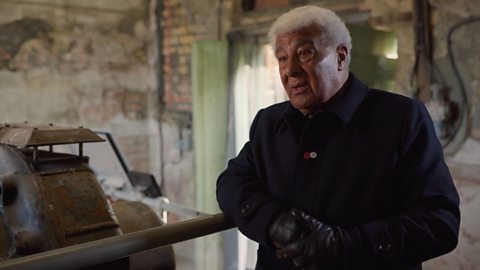
Alison Bennison - Working as a NHS nurse. video
This short film for primary schools follows Alison Bennison's journey to Britain from Barbados in 1960, to train as a nurse and work for the National Health Service. The story is told by Alison's granddaughter, Lindsey, and nine-year-old Dontay.
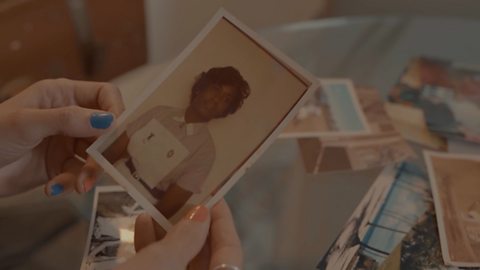
Christina Shingler - Becoming an author of children's literature. video
In this short film Felix, aged 10, talks to his grandmother Christina (Tina) Shingler, a writer who decided to do something about the lack of black characters in British literature.
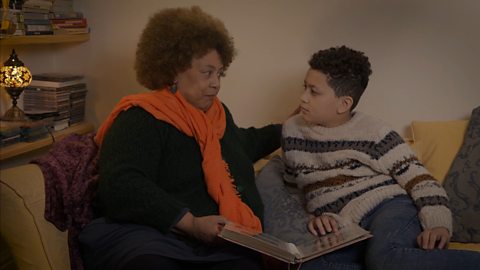
David Mwanaka - Becoming a farmer in Britain. video
In this short film 11-year-old Anashe meets David Mwanaka, and finds out about his journey from Zimbabwe to becoming a farmer in Britain.
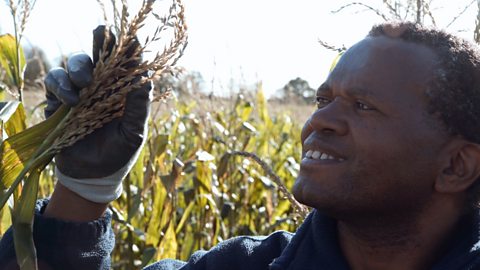
Elsie Owusu - Becoming an architect in Britain. video
In this short film 11-year-old Kendra meets Elsie Owusu, who moved from Ghana to the UK as a child and became an architect, and dealt with the challenges of working in a white, male-dominated profession.
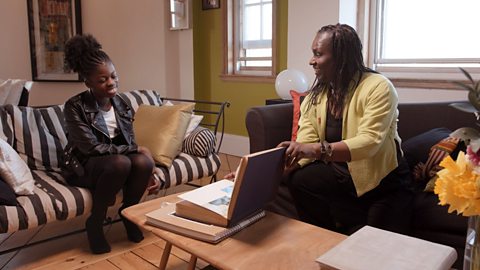
Eunice Olumide - Breaking into the fashion business. video
In this short film 12-year-old Lore meets Eunice Olumide, a second generation Nigerian who was born and grew up in Scotland and become a professional model.

Magid Magid - Becoming the youngest ever Lord Mayor of Sheffield. video
In this short film 14-year-old Abdirahman meets Magid Magid, a Somali-British activist and politician who served as the youngest ever Lord Mayor of Sheffield from May 2018 - May 2019.
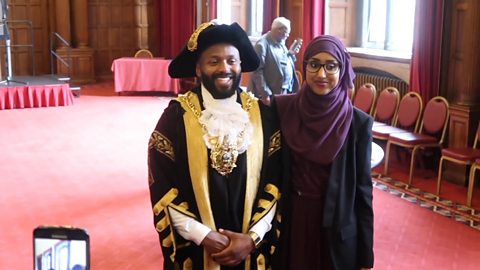
Vernon Samuels - The Bristol Bus Boycott of 1963. video
In this short film 13-year-old Amelia and Vernon Samuels, who represented Great Britain in the 1988 Olympics, tell the story of the Bristol Bus Boycott and Vernon's father, who was the first black bus driver in Bristol.
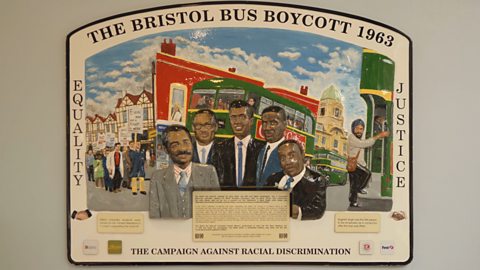
Yesha Townsend - A Bermudian poet in London. video
This short film tells the story of Yesha Townsend, a Bermudian poet who currently lives and works in London, and how she has been influenced by Mary Prince, a black woman who escaped from slavery.
